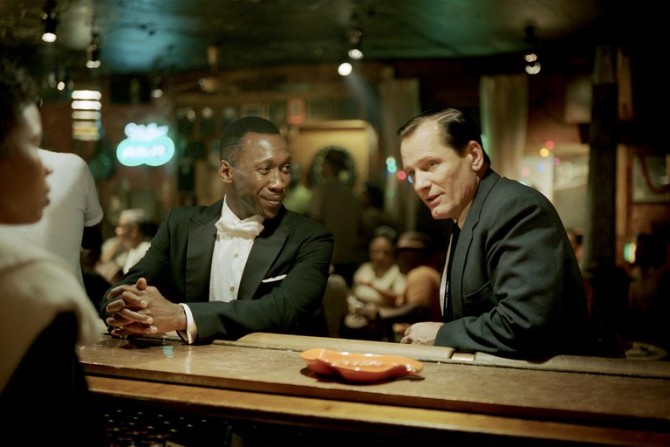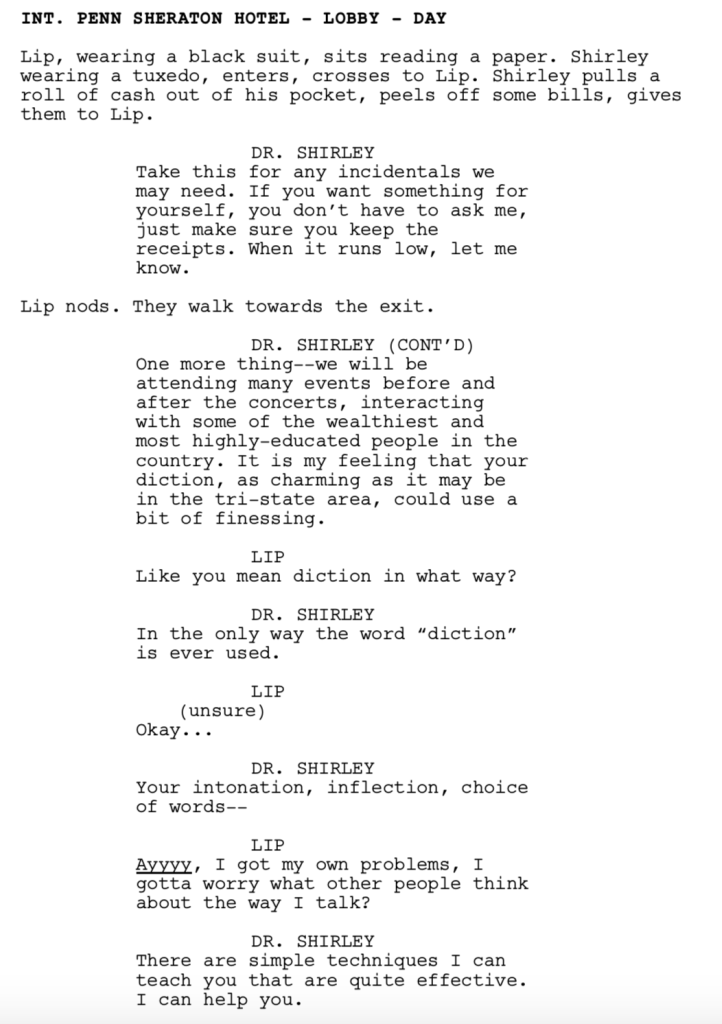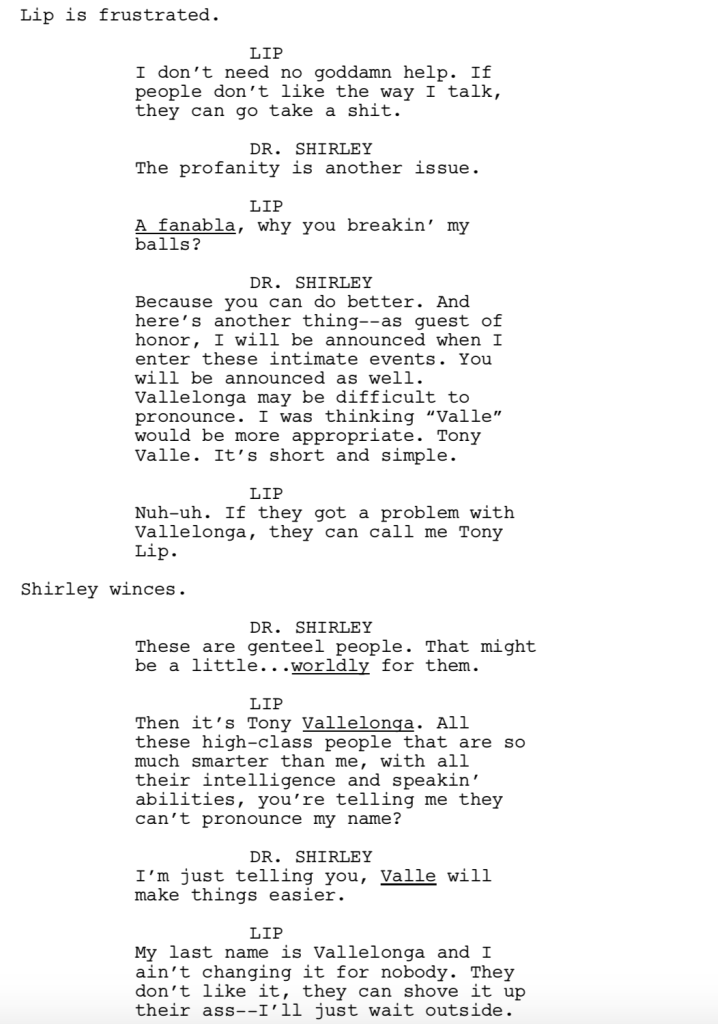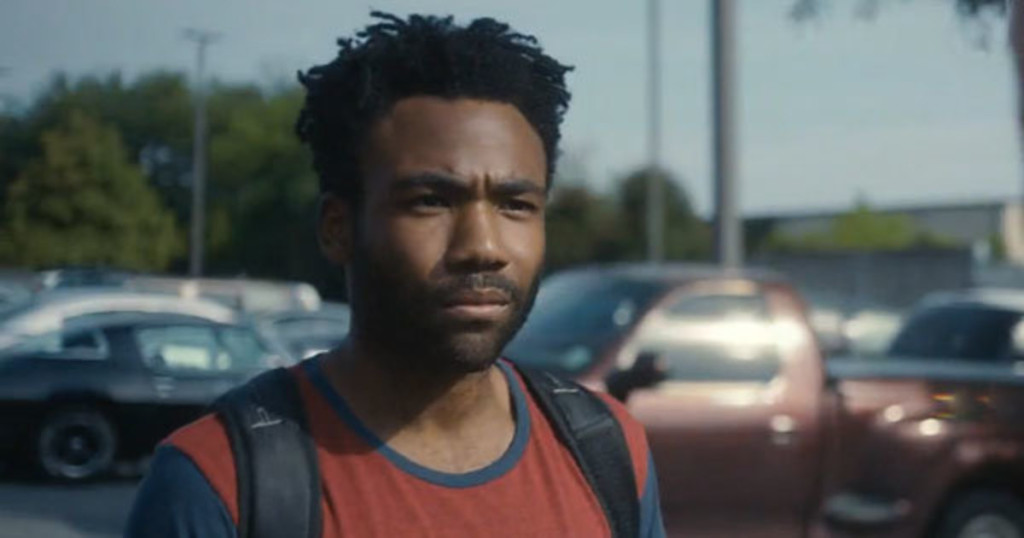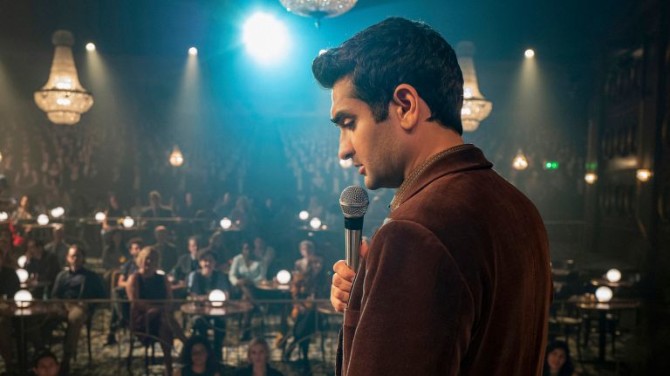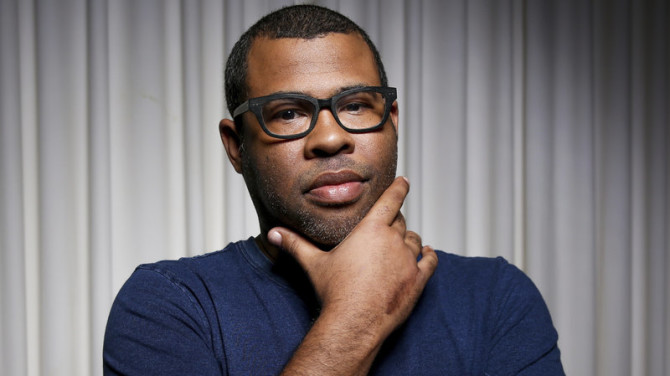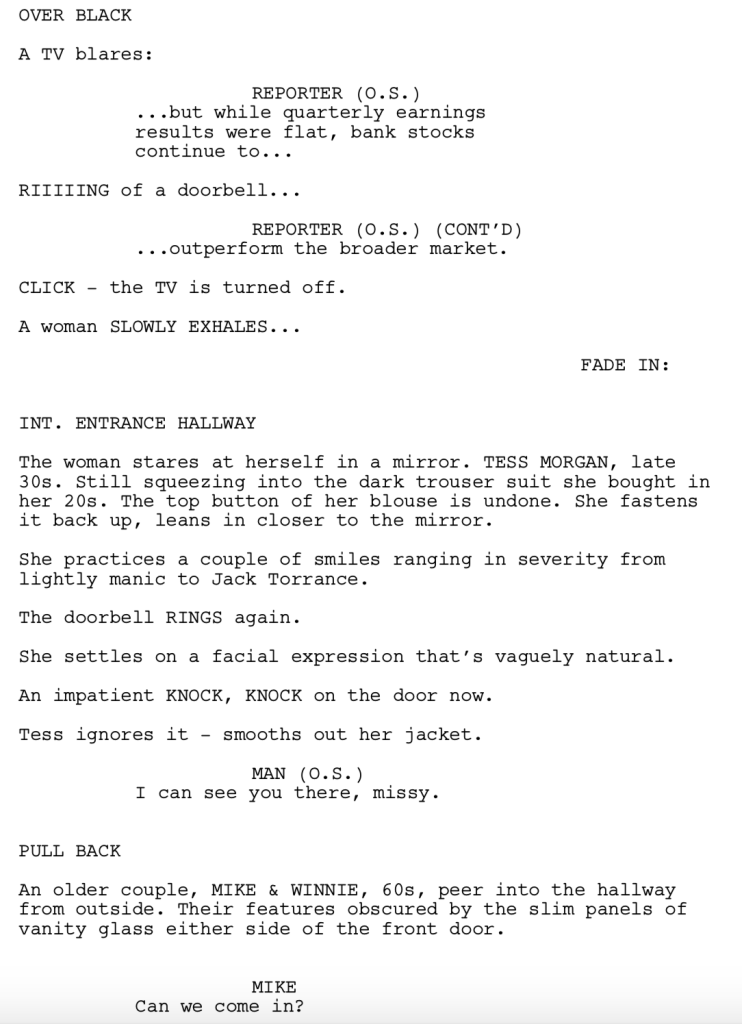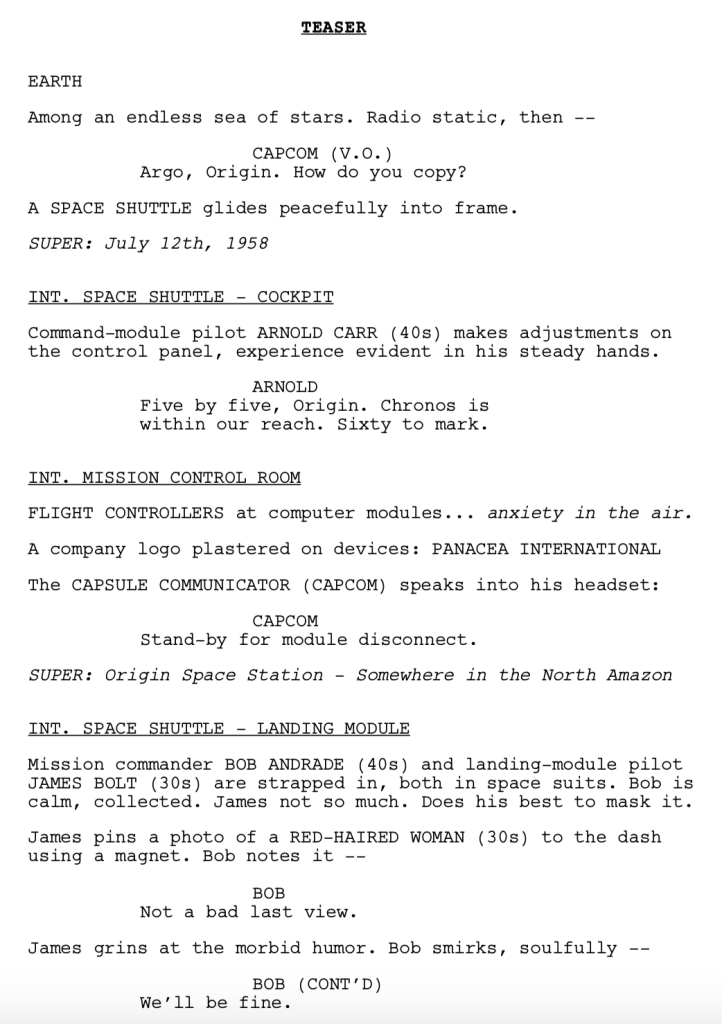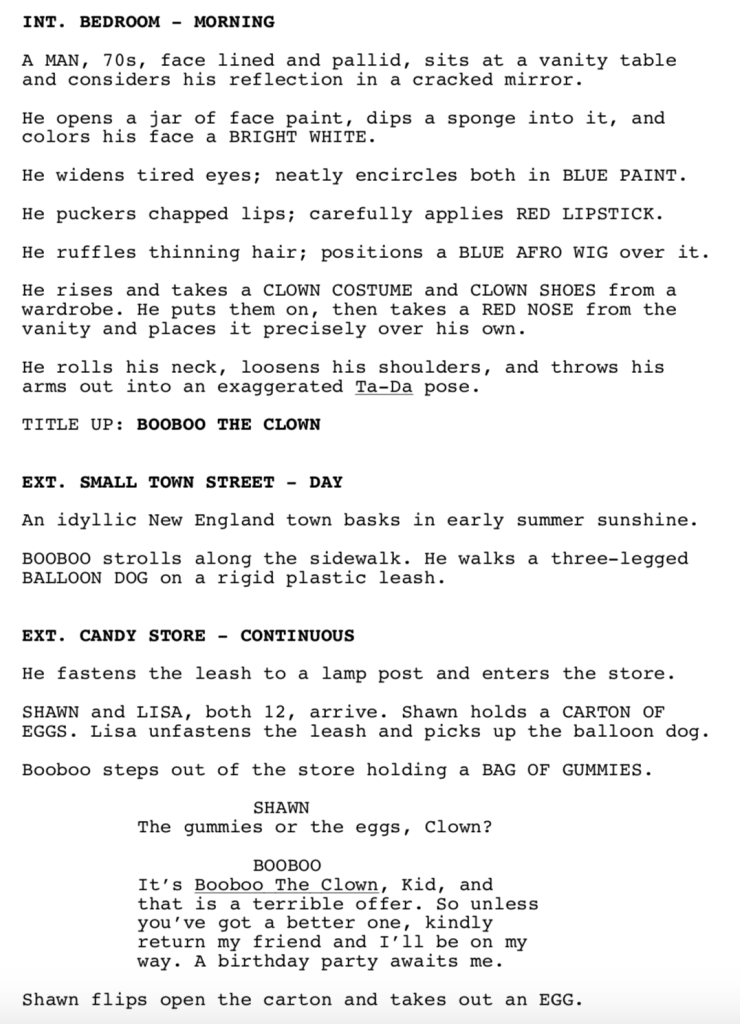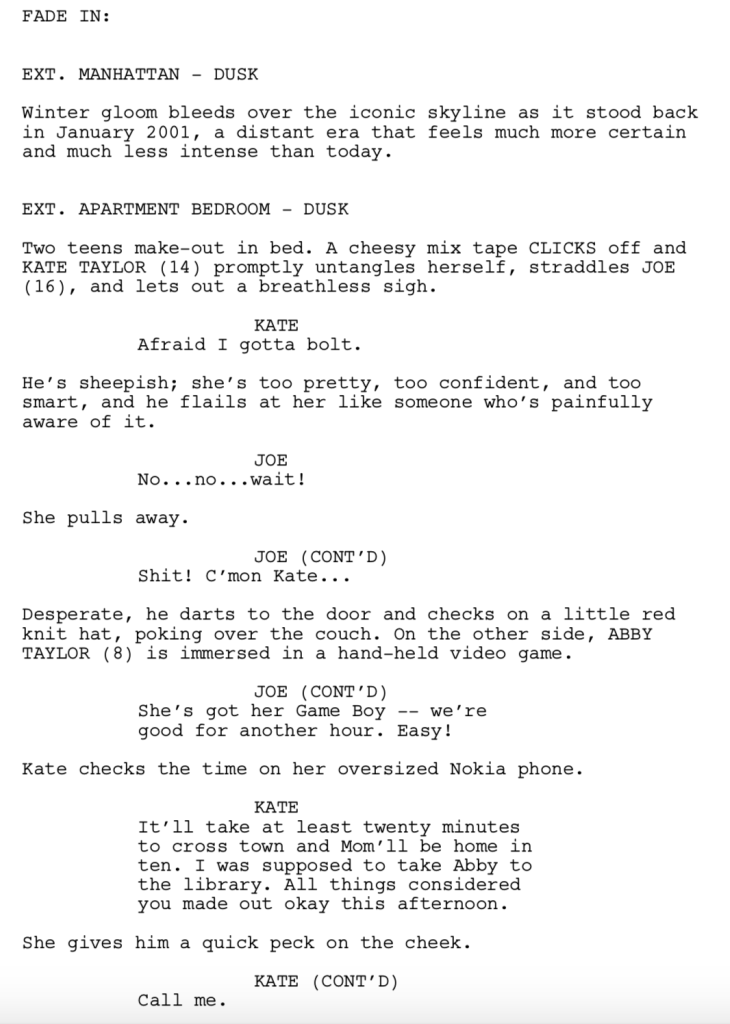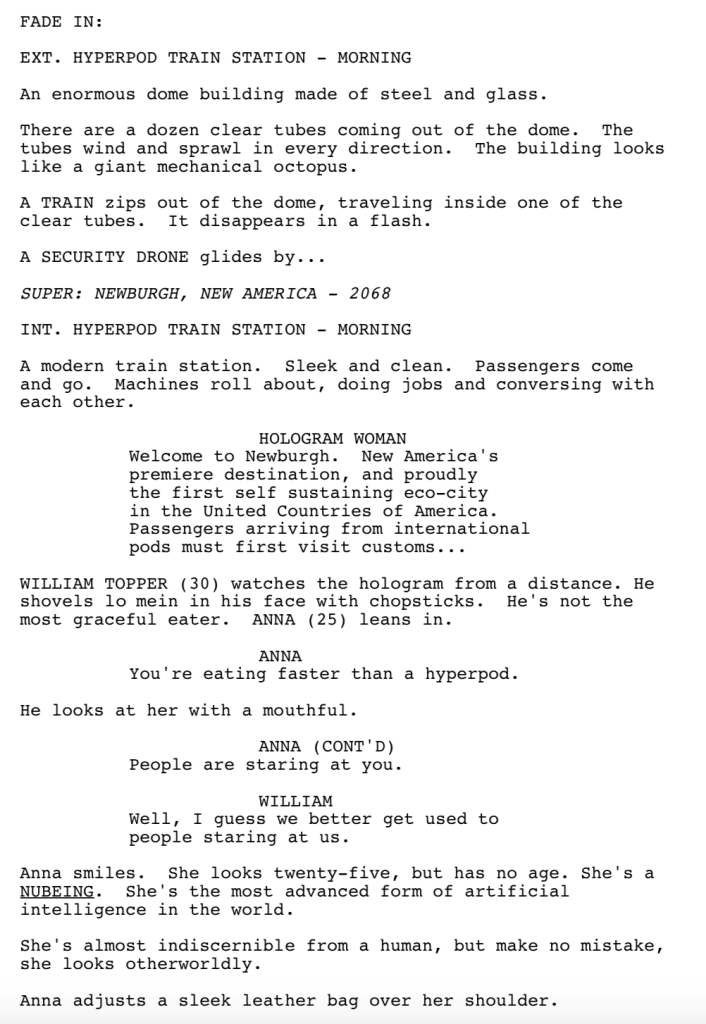We’re in the midst of a dialogue crisis.
Outside of Get Home Safe, a lot of the dialogue I’ve been reading lately has been downright forgettable. It didn’t take long to figure out why that is. A lot of the current dialogue out there lacks LIFE. And I have a theory as to why. There are very few people who can actually write good dialogue. There are even fewer people who know how to teach good dialogue. So what everybody does is create a new world order whereby the best dialogue is as little dialogue as possible.
Do these mainstays sound familiar? “Less is more.” “Come in as late as possible. Leave as early as possible.” “Show don’t tell.” If you told any screenwriting guru that they could only use one anecdote when talking to an audience of screenwriters, the one they would all choose is the scene where a married couple is in an elevator, the doors open, a beautiful woman walks in, the man takes off his hat and gives her a giant smile, and the wife, seeing this, takes a step away from her husband (there are several variations of this scene but this is the most popular). The reason gurus love this scene so much is because it says everything without the characters saying anything.
But here’s the problem with that. YOU CAN’T DO IT EVERY SCENE!!!! If you did, you’d have the most boring script ever. Here’s a newsflash: YOUR CHARACTERS HAVE TO TALK SOMETIMES. IF you keep running from that, not only will your script be unrealistic, but we’ll never get to know the characters. Sure, a character action tells us a ton about a person. But you know what also tells us a lot about a person? WHEN THEY TALK!
The anti-dialogue movement can be traced back to two periods. Period One was the Tarantino knock-offs. When Pulp Fiction became huge, everybody wrote their big dialogue-driven movie. What the industry and audiences quickly found out, however, is that not everyone can write cool off-the-cuff effortless dialogue like Tarantino. So in order to rein everyone back in, teachers, gurus and producers encouraged the less is more approach. Let’s get back to basics and only have people say things when they actually have to say things.
Period 2 was Juno. Juno was even more influential in curbing dialogue than the Tarantino Knock-Off Era because the movie’s backlash came at the beginning of everyone rushing to the internet to complain about everything they didn’t like about a movie. So that fun punchy overly stylized dialogue that Diablo Cody wrote was now considered persona non grata. You’d be better off writing a silent film than one with Diablo Cody dialogue.
Now I’m not knocking these age-old screenwriting lessons. Less is more in a lot of cases. For the most part, you should come in late and leave early. And showing me something is often going to be more impactful than telling me about it. But that doesn’t mean you should fear dialogue. You still want scenes where you let go and allow your characters to speak. Because what I’m encountering with this warped less-is-always-more view is that I leave the story feeling like I never got to know the characters. And if they would’ve had a few more conversations, that would’ve been different. I mean this isn’t rocket science here. How do you get to know someone? BY HAVING A CONVERSATION WITH THEM.
Now the tricky thing about screenwriting is that you have to do this, but you still have to dramatize it. In other words, you can’t put two characters across from each other in a diner booth and have them talk for 20 minutes and then when the Black List reader complains that he was bored, say, “Well Scriptshadow said it was okay because we needed to get to know the characters better.” No. Having long boring conversations at the expense of entertainment is not what I’m advocating. You have to figure out a way to maneuver these conversations into some sort of dramatic framework.
A big reason why the diner scene between Vincent and Mia in Pulp Fiction works even though it’s a big long dialogue scene with characters sharing their thoughts, is that Mia is one of the sexiest women on the planet, she’s flirting with Vincent, and she also happens to be the wife of his gangster boss. If he indulges in anything with this woman, his life is literally at stake. There’s tons of conflict in this scene even though it’s just two people talking. So that’s the catch. You want to add more dialogue to your scripts, but you have to do so within a framework where we’re still being entertained in the process.
So let’s say you master that part. You at least know how to a set up a scenario whereby your characters can talk and it not be boring. How do you then write memorable dialogue? What’s the trick to making those words sing in a way that gets everyone lauding you as the next great dialogue writer? Well, that’s the secret sauce isn’t it? If it were only so easy. The problem with writing great dialogue is that much of the advice that gets you there is not directly actionable. For example, if I say, “Keep your script under 110 pages,” that’s actionable. You have a clear directive to follow. But if I say, “Your dialogue is too bland. It needs more flavor,” it isn’t clear what one can do to add more “flavor.” This list below is the best I can do to bridge that gap for you. But ultimately, dialogue is a living breathing organism that can never be quantified. Its beauty, or lack thereof, will always be elusive.
1) Get into conversations with different types of people and pay attention to how they talk and what they say.
2) Dialogue, more than any other type of writing is about not thinking when you write. Let go and allow the characters to speak. See what comes out. You can always edit it back later if you go too far.
3) Understand your characters’ socio-economic backgrounds. This differentiates the characters and adds color to the dialogue. Someone from the Bronx will speak differently than someone from Silicon Valley.
4) Research vocabulary and slang on Youtube for character types unfamiliar to you. Bo Burnham did this with his characters in Eighth Grade.
5) Knowledge. The more you know about a subject matter, the more detail you can include in the dialogue. Aaron Sorkin is a master at this.
6) Embrace messiness. Real conversation is never perfect. Some people are distracted. Others mishear things. Some don’t care. Characters should never feel like they’re chess pieces waiting to be spoken through. They should speak of their own accord.
7) When conceiving of your story, include a couple of characters who like to talk, since those are the characters who often say the most interesting things. There’s nobody who liked to speak more than Steve Job in Sorkin’s, “Jobs.”
8) Every single person has their own unique sense of humor. Since humor is one of the most defining qualities, figure out what type of humor your character gravitates to. Gallows? Sarcasm? Dad-jokes? Dirty? Makes jokes at the expense of others?
9) Dress dialogue up. Phrase things in ways that nobody else would’ve thought of.
10) Listen to a lot of people, talk to a lot more, and study dialogue in all the great dialogue-driven movies – pausing every time you liked an exchange and asking yourself why.
I want to finish this off by posting a scene from the movie Green Book. I’ve never seen Green Book. However, one look at the characters and I knew they were designed for dialogue (one is highly educated while the other grew up on the streets). I flipped to a random scene in the middle of the script and I got this. The scene doesn’t hit all the beats I’ve discussed today (It’s relatively short). But it does get the characters talking to each other. It highlights the differences between their socio-economic backgrounds. One speaks eloquently. The other does not. And the scene has a dramatic purpose. They’re not just chatting. They’re working through a problem (Dr. Shirley needs Lip to look and act more refined for an upcoming event). Most importantly, I have a better sense of who these two people are after this conversation. For those who haven’t seen the film, Dr. Shirley (Mahershala Ali) is a famous black gay musician and Lip (Viggo Mortenson), a brute tough guy, is driving him cross-country from concert to concert.
I would love to hear your tips on writing better dialogue. And no, I don’t mean “include conflict,” and “less is more,” and “the best dialogue is when there’s no dialogue.” I mean when your characters ACTUALLY CONVERSE WITH EACH OTHER, how do you make it sound better? Discuss!
Genre: Drama
Premise: (from Black List) A young man becomes an emergency medical technician in Harlem as a temporary stop before he enters medical school. There, he experiences a range of crises and stressful misadventures, including a mentor who has been numbed to the point that he makes a wrong decision in a life-and-death situation.
About: This is a script based on a book. It made the Black List last year with 10 votes.
Writer: Ryan King (based on the book by Shannon Burke
Details: 106 pages
The only thing I’m going to say before I review this is thank God Shazam comes out on Friday. I need to cleanse myself of the depression this script put me in.
Ollie Cross is a 20-something paramedic trying to get into med school. He’s already been rejected twice. So he figured with a year of doing this on his resume, they’ll change their mind. He’s paired up with the 40-something king of paramedics of the Harlem unit, Gene Rutovsky. Gene hates the world. Hates everything really. But he hates being a paramedic less than he hates everything else, which is why he does it.
We’re dropped into the thick of things immediately. They go to a shooting. Then a man who’s having an asthma attack. Then a motorcycle accident. Then a bunch of kids abusing a dog. And then a girl who jumped off a building. Then a rotting man who died in his apartment alone eating pizza and watching porn. And, of course, the cherry on top, an HIV positive drug addict who was so interested in getting her next high that she gave birth to her baby in the toilet and let it die.
Well, that’s actually where our story begins, on page 67, since that’s where all great stories begin. The woman in question tells them her baby was stillborn, which is why trying to save it doesn’t matter. Rutovsky rushes to check anyway, and confirms that it is, indeed, dead. Except it turns out Rutovsky is lying. The baby was still breathing. But because it’s both HIV positive and will have brain damage for the rest of its life, he decides to smother it, a mercy killing of sorts. Oh yeah. This is a joyous trip, this screenplay.
The baby ends up surviving and Rutovsky gets in trouble from his superiors, who strip him of his paramedic’s license. Since Rutovsky has nothing else to look forward to, he kills himself. Cross then gets a new partner and continues to go on depressing emergency calls. But since the writer had already gone to the bottom of the depression barrel with baby euthanasia and partner suicide, there isn’t anything left to do. So we get a couple more 9-1-1 calls and the movie is over.
How can I put this without sounding mean? This wasn’t my cup of tea.
One of the ways people get angry just by reading something is when they don’t see a point to what’s being written. Everything feels like a big waste of time. There’s no quicker way to anger someone than to waste their time.
Actually, let me back up and compliment the writer on something so this doesn’t become a one-sided rant. The writer created a specific world here. That’s worth something. Specificity in subject matter is imperative to pulling us into your world and believing it. Black Flies achieved that.
But as the script unfolded, nothing beyond that specificity emerged. It was just a serious look at serious things dialed up to serious levels from serious characters so that we could feel like something serious was going on. I’m not saying I wanted the Will Smith Bad Boys version of this story. But I also didn’t want to be suicidally depressed for 107 minutes. I honestly wonder what writers are thinking sometimes. They’re so focused on executing their vision that they forget to ask what they want the audience to feel during the story. Why would you write a movie that just made people feel bad about life and depressed about the world?? Where’s the value in that? Where’s the freaking hope?
The script doesn’t even have a story. Where’s the PROBLEM that sets our hero off on a JOURNEY? The closest thing we get is the HIV stillborn baby death. But like I said, that happens on page 67. Everything is just a series of emergency call vignettes. That’s fine if this were real life. But it’s not. It’s a movie. A movie is where you make sense of the madness. It’s where you zoom in on the most interesting aspect of your idea and build a story around it, a plot that evolves, that gives our characters direction, makes us feel like we’re moving towards a destination.
So what you’d probably do is have the baby thing happen on page 25. Then, as they continue to go on these calls, the attempted baby-killing works its way through the system, putting a constant cloud over both of them. The mother wants to sue the hospital. The hospital is trying to cover certain things up. Some of the other paramedics want to rat Rutovsky out. Cross is going to be deposed. He has to decide if he’s going to lie or not. That would allow you to keep this vignette-style storytelling but still feel like the script has a destination, sort of like the way Flight was structured. Everything is leading towards that deposition. But, alas, we don’t get anything approaching that level of storytelling acumen.
On top of that, the script hits the same beat over and over again. All the way through. There isn’t one laugh in the entire script. It’s all serious serious serious serious serious. No, I take that back. In order to haze the new guy, the paramedics throw a dead dog through his car windshield. This is what acts as humor in this screenplay. You know you’re writing a joyous experience when you’re throwing dog death into the mix.
Look, I’m guessing this is some autobiographical year in the life experience someone had that they turned into a book. It all sounds real. But this is the exact opposite of what people want right now. We have enough hate and anger being thrown at us through the news and social media. What movies do best is they help us escape that for a couple of hours. They make us feel good. They make us smile and remind us not to take life so seriously. This script does the opposite of that. I don’t get it. The only reason I’m not giving it a “What the hell did I just read” is because it’s not written badly. It’s just a super depressing script without a story.
[ ] What the hell did I just read?
[x] wasn’t for me
[ ] worth the read
[ ] impressive
[ ] genius
What I learned: This script made a crucial early mistake. It didn’t set up Cross’s life before he became a paramedic. The reason this was such a misstep was that we had nothing to compare Cross’s crazy life as a paramedic to. When you don’t give us that visual comparison, we don’t think what’s happening is that big of a deal. If you show Cross yukking it up with friends and happy and having date nights with his girlfriend THEN you smash to his first day on the job which has multiple people spread out on the street bleeding from gun shots, you get that, “Oh my God, we’re in a completely different universe now” reaction.
What I learned 2: For those of you saying, “But Carson, didn’t you just hold a three month contest about starting your script with a great first 10 pages?” Yes. But just because you’re not starting your script with action doesn’t mean you can’t entertain us. That’s what the great writers do. They find an entertaining angle to almost any situation. And even when they can’t, they know to re-conceive the scene to something that DOES allow them to create an entertaining scenario.
Genre: Thriller/Supernatural
Premise: In the premiere episode of CBS All Access’s Twilight Zone, a bad comedian is given the opportunity to become famous. But that fame comes with a price.
About: When Hollywood showed up at Jordan Peele’s door with a blank check, the first thing he said he wanted to do was revitalize The Twilight Zone. So he teamed up with Simon Kinberg to bring the famous show into the modern age. Kinberg sold the show this way: “We would do what Rod’s instinct and impulse was, which was to break barriers, to tell new kinds of stories, to create something that was so outrageous and noisy and dangerous that it wouldn’t fit into sort of the standard way of storytelling.” Those are bold words. Is that what we got?
Writer: Alex Rubens
Details: 1 hour long
What’d you think we’d be talking about today?
It’s Jordan Peele’s world. We’re all just living in it.
Can Hollywood’s new golden child keep his winning streak alive? Find out with me.
Samir is a terrible comic. He’s convinced that comics need to have “something important to say about the world” for their act to be relevant. His main routine is about the second amendment, a heady dive into what each word in the amendment means. Needless to say, he doesn’t get many laughs.
Then one day Samir is visited by legendary comic JC Wheeler. JC tells Samir that he can be a great comedian. But he has to stop talking about politics and start talking about his life. When his next set tanks, Samir decides to use JC’s advice and tells the crowd about his kooky dog named “Cat.” Out of nowhere, everyone starts laughing.
Except when Samir gets home that night, his dog is gone. In fact, his girlfriend tells him they’ve never had a dog. What’s going on? The next day Samir does a set about his 10 year old nephew who wants to be a comedian when he grows up. Afterwards, his nephew’s been erased from existence.
Samir finally catches on. Whatever he talks about ends up being erased. So Samir begins using this power for evil. For example, he sees old friends on Facebook who he doesn’t like and talks about them on stage so that they disappear. Unfortunately, his success starts going to his head, and soon he’s blowing off his girlfriend and playing ‘cool guy at the bar.’
When Samir is given a chance at landing a big show, he needs only to beat out Didi Scott, his best friend at the club. Of course, why beat her out when he can just talk about her on stage and make her disappear? Will Samir stoop to that level? Or does he still have some semblance of morality in him?
I won’t call The Comedian an outright disaster. But it’s close.
Something feels off about the episode from the opening scene. It was the tone. It’s supposed to be this weighty examination of a comedian desperate for fame. Yet none of the characters were selling it. That’s when it hit me. Every single one of these characters is being played by a comedy actor. Which you would think makes sense in a script about a comedian. But this was a drama. Not a comedy. And the actors didn’t have the emotional depth to nail those dramatic beats.
It was around this time that I checked out who wrote this. Alex Rubens. The writer of such dramatic and thrilling films as Community, Keanu, Rick and Morty, Key and Peele. Not only were we missing actors who could handle the dramatic beats, we were missing a writer who could handle them as well.
Something tells me this was a movie idea of Jordan’s. But unlike Us and Get Out, he hadn’t fleshed it out. So he sent it over to his buddy Alex to turn it into a one hour episode on Twilight Zone. Somewhere in that exchange, Jordan forgot to explain what the episode was actually about. It starts out with a sliver of a good idea – Would you be willing to lose the people you love in order to become famous? But somewhere along the way it becomes about a guy who uses his power to make people he doesn’t like disappear.
The longer the episode went on, the more frustrated I got. This was the pilot episode for the rebirth of one of the most iconic shows ever. And you dump this garbage heap up to our door?
It might have been a lost cause from the start. Serious movies about comedians never turn out well. I think there’s two decent ones in all of history. Sure, there’s something ironic about examining the serious side of comedy. But you also take the best thing about comedy – laughing – and eliminate it from the equation. So now we’re just watching depression. Yippee.
That was another thing. I couldn’t tell if Samir’s comedy bits were supposed to be funny or if the audience was only laughing because JC had put a spell on Samir’s routines to make people laugh regardless of what he said. If we’re unsure whether your comedy bits are intentionally unfunny or not, your flick’s got a lot of problems.
The episode FINALLY finds a good thread when Samir, who suspects his girlfriend’s mentor, David, is trying to fuck her, brings it up in his next routine. Afterwards, David doesn’t exist. Except now, his girlfriend is no longer a lawyer. She’s a waitress. Why? Because her mentor, David, was never there to help her. Okay, I thought, now we’re on to something.
But in the very next scene, Samir’s girlfriend gets in a fight with him for no discernible reason. Why is she mad at him, I asked. She was just dying laughing watching his set. Ohhh, because it was time for an “argument scene.” Classic bad screenwriter mistake. Your characters don’t have a reason to argue. But you need them to argue for your next plot point to make sense so let the arguing begin!
Jordan Peele is the coolest nicest guy in the world. I saw him on Bobby Lee’s (a fellow comedian) podcast earlier in the year. The two go way back. When Peele started to blow up, he gave Bobby Lee a huge job that basically paid his mortgage for a year. And he does that sort of thing for a lot of people. But if Peele starts prioritizing helping his friends over creating good entertainment, he’s not going to be the belle of the ball for long. You still have to hire people who are capable of doing the job. The guy who wrote this episode is not capable of doing the job. Nor were half the actors cast in this episode. I hope Peele learns that lesson.
[ ] What the hell did I just watch?
[x] wasn’t for me
[ ] worth the stream
[ ] impressive
[ ] genius
What I learned: Although they found a way to screw it up, The Comedian is a good example of how to add a “tax.” A “tax” is something you add to your hero’s choices. The hero can choose to gain something (fame). But there’s a tax to that gain (something he loves ceases to exist). You should be taxing your characters with every choice they make.
In it, I share my thoughts on Apple’s confusing announcement for their new streaming service, Jordan Peele’s emergence as a screenwriting hero, give thumbs up and thumbs down to all those new trailers that debuted in the last month, and oh yeah, review a screenplay that I swore I would never ever review for as long as I lived. You’re going to want to check it out. If you haven’t received the newsletter, make sure to check your SPAM and PROMOTIONS folders in your e-mail program. If you can’t find it there, e-mail me at carsonreeves1@gmail.com with the subject line, “NEWSLETTER!” and I’ll send it to you. Enjoy!
It’s a slow weekend at the cinema which means I’ll have to watch something Netflix snuck onto its service while no one was looking (their preferred method of advertising). Who wants to start a website with me called “Media Aggregator” where we distill the 8 million TV and movie options down to a select few you should be watching? We’ll make billions. BILLIONS I SAY!
In the meantime, here are some screenplays to read.
Amateur Showdown is a mini-screenplay tournament where you read as much of each script as you can, then vote for your favorite in the comments section. Whoever receives the most votes gets a review next Friday. If you’d like to submit your own script to compete in a future Amateur Showdown, send a PDF of your script to carsonreeves3@gmail.com with the title, genre, logline, and why you think your script should get a shot.
Title: Bank, Die, Repeat
Genre: Time Loop Heist
Logline: A washed-up realtor gets caught in a time loop when she tries to rob a bank. Forced to relive the heist again and again, she’s soon convinced that whatever’s in the safe is more valuable than money, it’s the key to turning her life around.
Why You Should Read: This script started life as a three word phrase – ‘time loop heist’. It ended as a dark comedy I’d pitch as ‘Jerry Lundegaard stuck inside Danny Ocean’s Groundhog Day.’ Only Jerry is now a woman named Tess. — I’ve bludgeoned the protagonist with the despondency stick. Her love life, her family life, her working life – she’s losing control of it all. If you’re interested in how (or indeed, if) she can pull it all back together again and find redemption, then give the script a go. I’d appreciate your candid thoughts.
Title: Second Earth
Genre: TV Pilot – Science Fiction
Logline: Searching for a sense of purpose, an anxiety-ridden Earth orphan arrives on the prison moon Chronos as a new guard recruit… only to stumble upon a conspiracy for the near one million prisoners to stage a mass breakout and take the moon for themselves.
Why You Should Read: In the 1920s, Henry Ford established an industrial town deep in the jungle of Northern Brazil, hoping to make his own utopia called “Fordlandia”. Now imagine instead of a small town in Brazil… he did so with the moon. The series takes place in an alternate timeline where our moon, named Chronos, is habitable and is colonized by a billionaire philanthropist in the 1960s. Our story begins in 2082 as we see the moon now sustained by serving as basically a privatized prison for the United States and the colonies of Chronos wrought with civil tension between the descendants of the first Chronos colonies (called Natives) and Earthling immigrants. We will discover the story of the failure of this would-be utopia as we are embroiled in a conspiracy plot with a scale and character count rivaling that of Game of Thrones. Think A Tale of Two Cities in space.
Title: BOOBOO THE CLOWN
Genre: Family/Fantasy/Adventure
Logline: An eccentric old clown tries to cheer up a disabled boy by telling the story of his magical adventures on a lifelong quest to win the heart of a beautiful mime.
Why You Should Read: A massive THANK YOU to the commenters of Scriptshadow who read my first draft of this script and offered their valued thoughts and notes on it, and a special shout-out to Carson for his excellent notes and advice. All helped to propel this script to the next level. Booboo The Clown is an original, entertaining, and visually-appealing family-friendly movie. This one has it all. It has a larger than life lead character – a classic underdog – and a novel supporting cast with genuine arcs that actors will queue up to play. It has adventure. It has adversity. It has smiles, laughs and tears. It has scenes you have never seen before. And, most importantly, it has a fucking heart. I have poured my heart into this script and now I’d love to read your thoughts. I send it out as words amidst the wolves. Be ravenous.
Title: Fear Box
Genre: Horror
Logline: A traumatized single mother must protect her anxiety-ridden teen daughter when their darkest fears are brought to life by a haunted worry box.
Why You Should Read: It’s 2019 and it feels like anxiety is at an all time high! The goal was to write a fun horror script that deals with anxiety in a genuine way. The worry box is a real tool used to treat childhood and teen anxiety. I sent an early draft to the Bloodlist site for coverage and the feedback was positive. I’m hoping for some constructive criticism and the answer to the ultimate question before I spend tons more time working on this – is this concept/story something you would go see?
Title: D.I.R.E.
Genre: Science Fiction / Drama
Logline: Guess Who’s Coming to Dinner set 50 years in the future. A young man takes his Artificial Intelligence fiancé back to his small mountain hometown to meet his techno-phobic family.
Why You Should Read: I’ve been reading and following Scriptshadow for the last 7/8 years. Needless to say I’m a big fan of the site and all of you guys. I’ve just been lurking in the shadows (evil laugh). I live in Los Angeles, and have been a working writer for the last decade or so… but primarily in late night TV. I haven’t been able to crack the ever elusive feature world yet. This script is my first feature where all of my feedback has been super positive. And not the fake “I’m your friend” positive… as a writer you know the difference. Anyway. I’m extremely serious about the craft, and have put a ton of work into this one. If you like SciFi dramatic mysteries… this is for you… if you hate robots then beep boop beep boop… it’s probably not your cup of ET.

